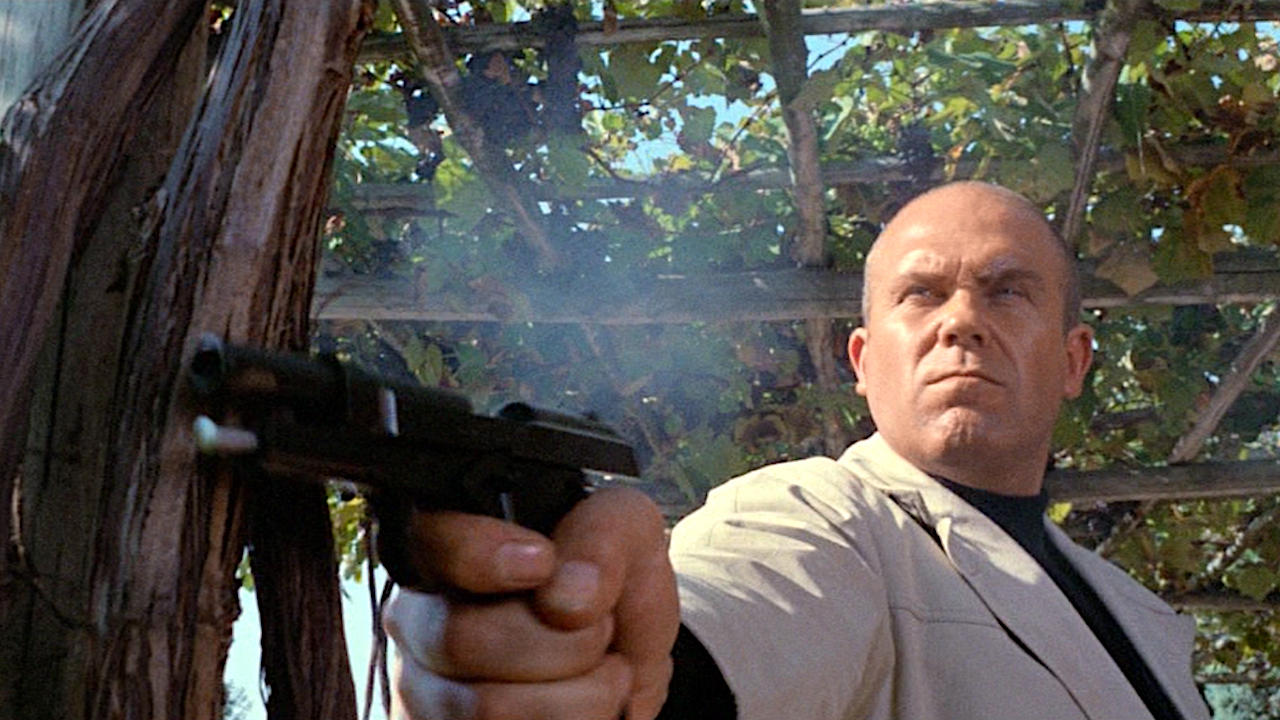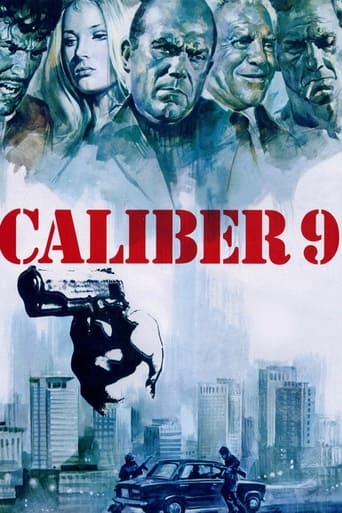

An ex-con attempts to go straight but cannot escape the influence of his old crime bosses. Underpinning everything is the matter of a missing $300,000 that he is under suspicion of stealing. The mob and the police want him to reveal all, while he protests his innocence.Milan Calibre 9 is one of crime specialist director Fernando Di Leo's most famous movies. He was probably the best director in the Italian poliziotteschi and is responsible for several other classics of that sub-genre, such as The Boss and The Italian Connection. Like those, this one is also a fast paced, tough and violent flick with some excellently staged action scenes. The big shoot-out at the outdoor garden party stands out as an example of the latter. But mainly the story is driven more by interesting characters and a fairly complex plot with several twists and turns.The Milan setting itself is used well, with a good sense of place. Unlike the other Italian thriller genre of the 70's, the giallo, the poliziotteschi were virtually all set in Italy itself. Many, like this one, featured the city in question in their title. They were more realistic than their more stylised gialli counterparts and I guess they connected with their audience in a slightly different way in that they provided thrills along with observations about contemporary crime concerns. Milan Calibre 9 like other Di Leo crime films has some such social commentary. The corruption in the justice system and the degradation of the mafia are subjects that are touched upon.It benefits from a very strong cast. Mario Adorf is in his element as the sadistic gangster Rocco, he owns every scene he is in. Barbara Bouchet is as exquisite as always, she plays a night-club dancer who is introduced to us in a mouth-wateringly erotic dance routine. Lionel Standler is very convincing in the role of the sinister crime boss The Americano; while the two cops are played by reliable Italian genre film regulars Luigi Pistilli and Frank Wolff.All in all, this is a quality action-thriller that remains relatively obscure. It's a very good example of what the Italian crime movie was all about.
... View MoreLike The Italian Connection, this Fernando Di Leo film features Mario Adorf. It also features Barbara Bouchet (Gangs of New York), who left the States in the 70s to do Italian films. She jumped from Police films, to giallo, to erotica. Always a pleasure to watch.This is a typical double cross film with a missing $300,000. Who took the money? Who will end up with the money? Who will double cross whom? The police just sit back and let the mafia, led by the Americano (Lionel Stander) tear each other apart.Lots of fights, a big shootout, and some fine performances by Adorf, and Gastone Moschin
... View MoreWhile I'm a huge Quentin Tarantino fan, it wasn't him the one who introduced me to the Italian filmmaker Fernando Di Leo. That would have been the usual, however this time my introduction came thanks to the twitter page of film critic Harry Knowles. He referred to some Fernando Di Leo movies as "awesome Italian Mafia movies that make the mob out to be the piece of s*** they are". I was immediately interested and later on I found out that Tarantino was a huge fan of Di Leo (and that John Woo too). So when I finally got from ebay the new Blu-Ray set of the "Fernando Di Leo Crime Collection" (with four of his films: MILANO CALIBRO 9, LA MALA ORDINA, IL BOSS and I PADRONI DELLA CITTÀ), it was just f****** great. After watching the pre-credit part of MILANO CALIBRO 9 (first film of the set) I was thinking something like "this is exactly how you start a crime film!" It blew my mind actually, and it definitely gives you a taste of how these bastards do things: is all about order and caution until something goes wrong then is all about being the boss and merciless violence. Plus, it gives you what is pretty much an unforgettable score; great stuff and I don't think I'm going too far if I say that it is one of my favorite opening sequences ever. MILANO CALIBRO 9 bring us the story of Ugo Piazza (I'm pretty sure this name will stay with you just like it stayed with me), a criminal who just got out of prison after a four-year sentence (that was reduced to three years due to his good behavior). This film is like a giallo, with mystery all the time and an unknown red-dressed man who happens to follow the movements of our main character; is having the question "did Piazza stole or not $300,000 from a very powerful crime boss (known as "the American")?" instead of the classic giallo question of "who is the murderer?" We have some really memorable characters. Take for instance the conclusion of the film (don't worry, I'm not going to spoil you the whole thing): sometimes in movies those big plot twists simply don't work. Here we don't have that case but I really don't think the ending would have been as great as it without the -just awesome- involvement of the character Rocco (played by the German actor Mario Adorf - Rocco sort of looks like the Eli Wallach from the THE GOOD, THE BAD AND THE UGLY days!). You just have to love this Rocco guy, even when he is like the most unlikeable and annoying bastard around. Even some of the minor "mafiosos" deliver memorable and fun material (like that one who helps an old man to solve a crossword puzzle). And well, Barbara Bouchet is simply a delight. While Di Leo's film didn't fully explore them, it did have some interesting thoughts on the Mafia, the illegal drug trade and even the police system. I found many similarities with the great and realistic show THE WIRE; in both we have the flaws of the police system exposed (and incompetent chiefs too), the thing of drug dealers investing their earnings in the building of apartment blocks (that thing is only mentioned here by the character Don Vincenzo, a blind old man who once was a respected crime boss) and the overall interest of some police officers to not only go after the "mafiosos" but also after the people with the dirty money. Based in all of this, maybe I should say this film is ahead of its time but really who knows? Actually I will just say this: it's just a f****** great film! *Watched it on 7 April, 2012
... View MoreSome movies you just need to watch a few minutes to know you'll love them. Fernando Di Leo's Caliber 9 opens with a gangster overseeing a criminal operation in a pigeon-occupied plaza. A package containing $300,000 moves across the city, passing from runner to runner, until ending up in the hands of the sadistic Rocco (Mario Adorf), an enforcer for a crime lord. But along the way someone has replaced the bank notes with blank pages. Rocco's revenge is swift and brutal, rounding up the runners one by one and disposing of them in one explosive go. It's a stylish, fast-paced montage, playing to an amazing main theme composed by the legendary Luis Bacalov. Five minutes is all we need to know that Caliber 9 is a violent, mesmerizing, exciting movie.Who stole the money? That's the movie's mystery in this mixture of Italian Poliziottesco and American film noir. The Poliziottesco is a crime/action subgenre of Italian cinema that flourished during the '70s, characterized by its unglamorous and graphic depiction of crime and violence. This came out the same year as The Godfather, and it's interesting to compare how each country portrays organized crime. Coppola's loyal, honourable family has no place in Di Leo's Italy. Rocco has no problems torturing a woman by smashing her face against furniture repeatedly. It's violence divested of entertainment values; the criminals aren't nice and we're not supposed to like them.Rocco and the police think Ugo Piazza (Gastone Moschin), a runner involved in the scheme and who was arrested shortly after for a botched robbery, stole the package. Both Rocco and the Police Commissioner (Frank Wolff) are waiting for Ugo to go get the money. The police see this as an opportunity to arrest Rocco's boss, the crime lord known as The Americano (Lionel Stander).The only problem is that Uzo vehemently denies having taken the money, and he intends to prove it so he can settle down again with his former girlfriend, Nelly (Barbara Bouchet). Ugo could have walked out of an American film noir: a man of few words and fewer friends, caught between brutal thugs and cops who wants to use him as bait, running against time to prove his innocence, he has the typical aura of doom that looms over the lives of film noir protagonists.His only connections in the crime world are the blind Don Vincenzzo (Ivo Garrani), a former Mafia Don, and his bodyguard, Chino (Philippe Leroy), but they refuse to get involved out of principle. If Ugo really stole the money, then he broke rules of conduct amongst criminals. The movie is very ingenious in the way it contrasts a mythical, bygone age of honourable Mafiosi, nostalgically recalled by Don Vincenzzo, and the unchecked vicious thugs controlled by Rocco. The concept of honour comes back to haunt Chino at the end, in one of the movie's many twists.But Ugo is a resourceful guy, capable of withstanding a beating if that will further his goals. Although not the physical type he's smart and we watch him manipulate Rocco, The Americano, the police and Chino like pieces in a chessboard, except he's moving the pieces on each side. Anyone who has seen A Fistful of Dollars or Miller's Crossing may think they know where this is going, but the way Ugo turns everyone against each other is a class act on its own level.The acting is efficient but not stellar. Moschin's subdued performance is the perfect counterpoint to the over-the-top tour de force by Adorf, who bursts into the screen like a wild beast ready to tear his preys apart. Although his performance as a tough, nasty thug lends itself easily to parody, it's also one of the funniest aspects of the movie The movie also suffers from something endemic in Italian cinema from the '70s. At the time almost everyone in the arts was a leftist and usually the films were full of political content. Some directors knew how to incorporate this naturally into the story – Elio Petri's Investigation of a Citizen Above Suspicion does a great job showing the way a fascist cop's mind works, and Bertolucci's The Conformist is a sober portrait of life in Mussolini's regime. Others failed to marry story and content and turned into pamphlets. Such is the case of Caliber 9 at times: actors Frank Wolff and Luigi Pistilli play politically opposed cops and slow down the narrative with conversations about the social causes of crime, the treatment of inmates, political corruption, etc. These scenes seem to belong in another film, and Di Leo only justified not removing them because Wolff and Pistilli deliver great performances.
... View More